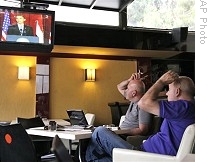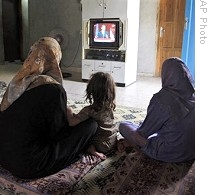Jerusalem
04 June 2009
Palestinian officials are hailing U.S. President Barack Obama's speech to the Muslim world as a good first step toward resolving the Middle East conflict. Israel said it hoped the U.S. president's speech will help usher in a new period of reconciliation in the region.
Something for everyone
 |
| Israelis watch President Barack Obama's speech from Tel Aviv cafe, 04 Jun 2009 |
In the end, the speech had something for everyone.
He pleased many Israelis by calling for Palestinians to abandon violence, saying the Islamist militant group Hamas must recognize Israel's right to exist, and calling for the prevention of a nuclear standoff with Iran.
Two-state solution
 |
| Palestinian family watches President Barack Obama's speech in Beit Lahia, northern Gaza Strip, 04 Jun 2009 |
A spokesman for Palestinian President Mahmoud Abbas said the speech was a good start towards a new policy that recognizes the suffering of the Palestinians.
Political analyst Mahdi Abdel Hadi, director of the Palestinian Academic Society for the Study of International Affairs in East Jerusalem says the speech contained no new ideas, but went a long way to making people feel good about the new U.S. administration's policy in the Middle East.
"It was a moving speech. The new element is [the] changing [of] the format of the political game, the tools of the political game, and the scene of the political game. It is here," he said. "It is the Middle East. It is not Washington. It is not Paris. It is not London. It is me, here, knocking on your door telling you, "Trust me, accept me, and I can make a difference."
Some concerned
Some Israelis had been concerned Mr. Obama might step up his criticism of the Jewish State and possibly unveil new policies that would be less favorable to Israel, which receives billions of dollars in U.S. aid each year.
A major Israeli newspaper showed a caricature of Mr. Obama wearing a Palestinian head scarf, indicating the belief among some Israelis that Obama favors the Palestinians.
Mr. Obama said the bond between Israel and the United States is unshakable. Some analysts say there is reason for Israel not to expect any major changes on the part of its traditional ally and supporter.
Period of reconciliation?
An Israeli government statement said Israel hopes President Obama's speech will help usher in a new period of reconciliation in the Middle East.
Political Science Professor Abraham Diskin of Hebrew University in Jerusalem says he is not optimistic Mr. Obama's strategy of softening the U.S. image to the Muslim world will bring peace.
"There is no question that Mr. obama is a great person, a bright person, a great speaker, and a person who definitely appears - and I believe truthfully - as someone who believes in a vision," he said. "I am afraid that the result of the speech today, unfortunately, is going to be at the end of the road, more violence. Too many times, when people like Obama came with such a vision, it was understood as weakness."
New attitude
While the speech contained no surprises in terms of U.S. policy on the Israeli-Palestinian conflict, it did signal what many here see as a new attitude by the United States.
This U.S. president has taken on the Middle East peace process early on in his term, unlike some of his predecessors who have stepped up pressure only at the end of their tenures.
Many here perceive this as a sign the new administration is placing a higher-than-usual priority on resolving the conflict. With that hope comes the expectation that words will be translated into actions.